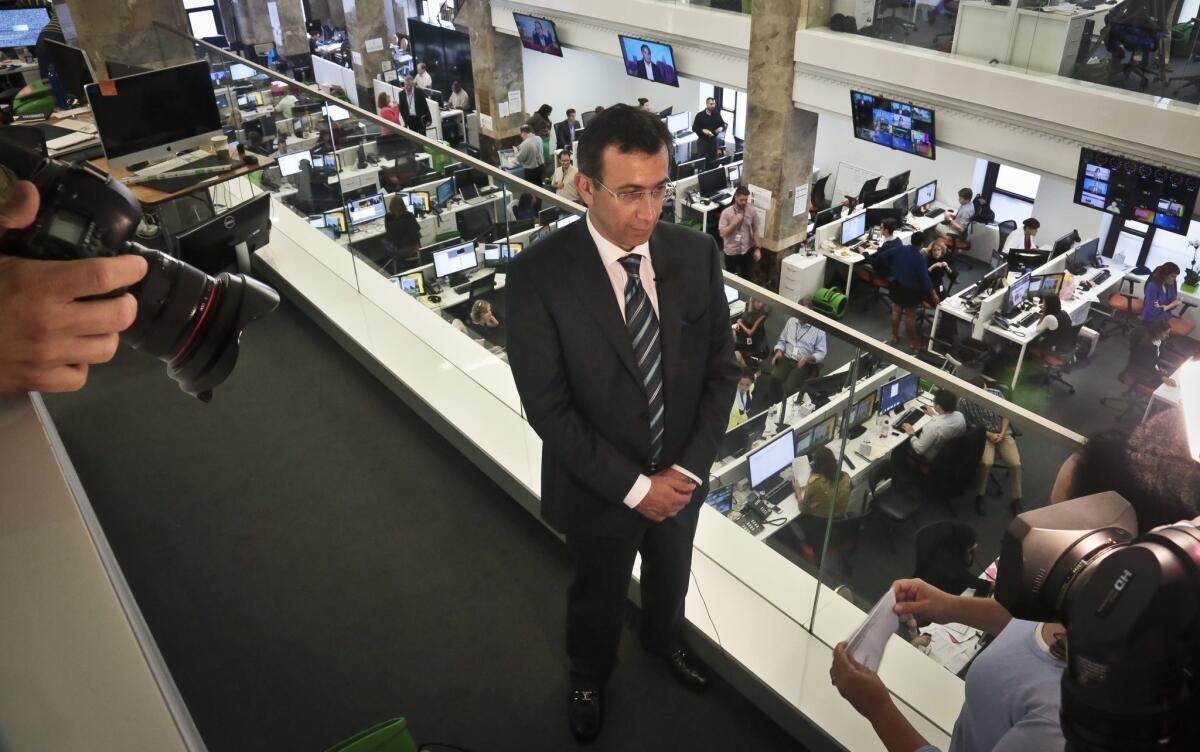Critic’s Notebook: Al Jazeera goes all American

You have to give Al Jazeera America major points for chutzpah.
In the face of fears that its parent company is essentially anti-America, it launched its new network with a tear-down of the American television news media. Its Tuesday premiere on the network formally known as Current TV opened with an hour dedicated to Al Jazeera America’s mission statement: Offer an intelligent, unbiased, wide-reaching alternative to the broken and pitted mess that is currently in place.
Al Jazeera America is going to out-America everyone.
Indeed, the various reporters, executives and anchors explaining why they joined the Al Jazeera team may have avoided the term “lame-stream media” but only just. It’s always dangerous to go negative, but the problem Tuesday was not so much the startling sight of journalists using terms like “core values,” “real people” and “your America” as it was the obvious contradiction.
PHOTOS: Hollywood Backlot moments
In plugging its commitment to providing America the news it deserves, Al Jazeera also touted the many respected journalists it has drafted to its cause. The roster includes former CNN anchor Soledad O’Brien, ex-CBS News reporters Sheila MacVicar and Joie Chen, as well as former NBC News anchor John Seigenthaler.
In other words, purveyors of that American television news they just spent an hour trashing.
Like I said, chutzpah.
But then, that’s certainly what the network requires to overcome not just the prejudice associated with its name but also the forces that have driven so many shows to become the simplified, opinionated, celebrity-driven drivel Al Jazeera seeks to replace. Sure, the money supplied by the Qatar government, which owns Al Jazeera, may help, but it doesn’t solve the problem of the overtaxed American attention span and its increasing demand for iPhone-sized answers.
PHOTOS: Celebrities by The Times
For instance, it’s tough to make a half-hour of truly informed conversation about climate change interesting; it’s almost impossible if you’re going to rely on three talking heads and some fairly banal graphics, as former C-SPAN host Libby Casey did on her first issue of “Inside Story.”
Indeed, the opening hours of Al Jazeera America had, for all its high ambitions and expensive expansion, a muted color scheme, unexciting camera work and sophomoric graphics. This may be part and parcel of a more “old-fashioned” approach — let the news be the news — and certainly there can be an over-reliance on bright and shiny graphic elements at the expense of content.
But this is television, and even those of us genuinely interested in the topics don’t want to spend half an hour staring at three people quoting studies.
More successful were reports from abroad, including an investigation into Wal-Mart’s use of subcontractors in Bangladesh on the 2:30 p.m. newsmagazine “Fault Lines.” Also, there was a refreshingly cogent explanation of the recent turmoil in Egypt during the one o’clock news hour.
Each were oddly flawed: The “Fault Lines” report had an irritating “Exorcist”-like soundtrack, and in discussing the Egyptian situation, anchor Tony Harris felt obligated to mention how folks in his hometown of Baltimore sometimes wonder why they should care about the Middle East (Real America! Your concerns!).
But still, it was solid reporting about provocative topics at a pace that allowed a viewer to not just hear but to absorb.
There is, of course, plenty of good storytelling done by American television news, but Al Jazeera, which came into prominence here for its extraordinary reporting during the “Arab Spring,” is a welcome addition. Still, it’s difficult not to wish they’d lay off the nationalist bunting.
There’s nothing wrong with having an expertise in international reporting. Insight into the Middle East is actually a plus, and the Americans who are going to tune into Al Jazeera America do not have to be spoon-fed a reason to do so.
ALSO:
Al Jazeera America: the New Kid on the Block
Al Jazeera America details programming lineup
Al Jazeera America sets team for August 20 launch
More to Read
The complete guide to home viewing
Get Screen Gab for everything about the TV shows and streaming movies everyone’s talking about.
You may occasionally receive promotional content from the Los Angeles Times.







